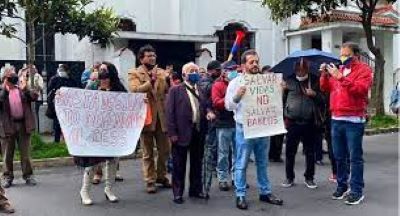A sit-in was held in Quito in response to the shortage of drugs to treat catastrophic illnesses.
By Viviana Erazo
With slogans and banners, members of the Social Security Institute, IESS, staged a sit-in to denounce the lack of medicines and alleged mistreatment of patients by health workers. In this action outside the Zarzuela Building in the north centre of Quito, they also rejected a possible privatisation of the IESS through the reform of the Social Security Law. In response to this, they raised their voices saying “IESS is not for sale, IESS defends itself”.
Among their slogans, the affiliates demanded the urgent payment of the debt that the Government maintains with the institution, which amounts to USD 8,037 million. According to them, non-payment of this debt would affect the sustainability of the institution in the medium and long term.
The lack of medicines in hospitals has been reported for several months. Thus, the Association of Parents of Children and Adolescents with Cancer (Apnacc) together with the National Anti-Corruption Commission denounced the lack of drugs for cancer treatments for children and adolescents on 22 January 2021, in an appearance before the Ombudsman’s Office in Guayaquil.
Regarding the shortage of medicines, the president of the IESS Board of Directors, Francisco Cepeda, in an appearance before the National Assembly in December 2021, reported that the IESS health infrastructure has 101 medical units and 659 clinics of the Seguro Social Campesino (Peasant Social Security) distributed nationwide. Of these health units, the Carlos Andrade Marín Hospital in Quito was, until 7 December 2021, the entity with the most problems of shortages, reaching 72%.
Cepeda explained that the lack of medicines in IESS hospitals is due to problems when purchasing through the National Public Procurement Service (Sercop). Faced with this problem, the IESS together with the Ministry of Health announced an emergency purchase of medicines last year. This action was intended to supply the health units of both institutions for five months.
This process consisted of the massive and immediate purchase of drugs and involved public companies, which were responsible for obtaining the medicines from the pharmaceutical companies and supplying the medical units, according to both institutions via Twitter. Health Minister Ximena Garzón said that this emergency purchase was legal and would guarantee the supply of medicines for five months.
For this process, Social Security, through its representative, said that around USD 20 million was allocated. The announcement was made in December 2021, by which time Cepeda said he received the hospitals with a supply of 30% and that in the last three months, the availability of drugs had risen to 54%. The IESS aims to reach an 80% supply of medicines by 2021, rising to 85% in the first months of 2022.
In this purchase, according to information from the Ministry of Health, priority medicines were acquired, mainly for cancer, which should supply 135 hospitals and health centres in Guayaquil and Quito by May.










